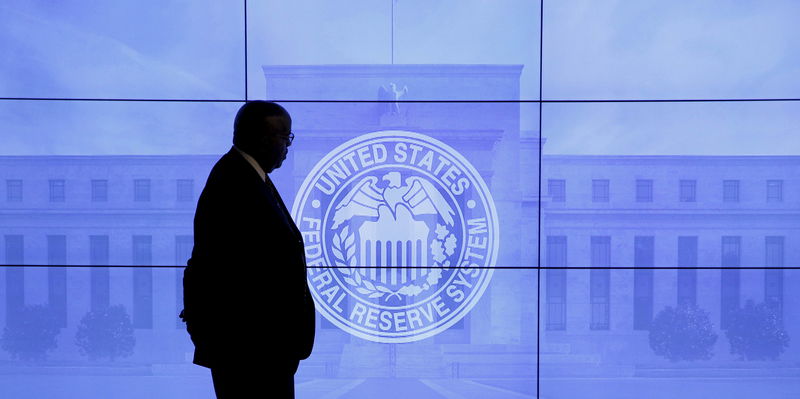By John Kemp
LONDON (Reuters) - Global investors are flocking toward the safety of the dollar, euro and yen and prime-rated government bonds as fears of a recession and a downturn in equity valuations surge.
The good news is that most indicators suggest the level of financial market stress remains moderate rather than severe, which will provide some reassurance for policymakers.
The bad news is that stress can move from moderate to severe very quickly, something policymakers will want to ensure does not happen.
The U.S. Treasury yield curve has continued to invert, a clear signal that bond traders expect a prolonged slowdown and more interest rate cuts.
The 3-month to 10-year segment of the curve has been continuously inverted for 2-1/2 months so far with long rates now 34 basis points below the short end, the most extreme inversion since April 2007.
In the last five decades, sustained inversions lasting three months or more have always signaled the arrival of a recession in the next 12 months (https://tmsnrt.rs/2MOUikw).
The current inversion is already more severe than the mid-cycle slowdowns of 1995 and 1998, though not yet quite as serious as before the end-of-cycle recessions in 2001 and 2008.
Before the last two recessions, inversion peaked at 59 basis points in March 2007 (recession started in December 2007) and 85 basis points in December 2000 (recession began in March 2001).
But in a sign of increasing stress that will worry policymakers, the curve has continued to invert despite the quarter-point cut in interest rates announced by the Federal Reserve at the end of July.
Fed funds futures imply interest rate traders expect the U.S. central bank to cut interest rates by at least another 50 basis points and probably 75 basis points before the end of the year.
Rate cuts totaling 75-100 basis points before year-end would be similar or slightly larger than during the downturns of 1995 (75 basis points) and 1998 (75 basis points) but smaller than during the last two recessions.
FLIGHT TO SAFETY
Fears about a global slowdown and a fall in the price of equities and other risky assets have already prompted a traditional flight to safety from higher-risk to lower-risk assets.
As bond prices have surged, yields on 10-year U.S. Treasury Inflation Protected Securities (TIPS) have fallen to just 10 basis points, from more than 30 basis points in late July, and over 100 in November 2018.
TIPS yields are down to the lowest level since October 2016, when the central bank was struggling to boost a sluggish economy and the federal funds rate was still set at a post-crisis rate of just 25-50 basis points.
Rising perceptions of risk are also prompting the reallocation of funds to markets at the core of the system (United States, Germany and Japan) and away from OECD economies on the periphery (Australia, New Zealand) as well as emerging markets.
As carry trades unwind, the U.S. dollar, Japanese yen and euro (low risk, low interest rate funding currencies) are all rising against the Australian and New Zealand dollars (higher risk, higher interest earning currencies).
So far, however, the flight to safety remains orderly, and shows no sign of the panic that accompanied the subprime crisis (2007/08), dotcom bust (2000/01), Asian financial crisis (1997/98) and Mexico-initiated tequila crisis (1994/95).
In the United States, corporate credit spreads for mid-rated Baa borrowers are mildly elevated but have remained steady since the start of the year, which suggests the shift to safety has not turned into a rush for the exits.
Policymakers will want to keep it that way, which makes further interest rates by the Federal Reserve and other major central banks likely.
Experience suggests once stress levels are already moderately elevated it does not take much to push them into a severe condition and the shift can come very rapidly.
Unless economic incoming data starts to become more positive, or the United States and China manage to de-escalate their conflict, the Fed will likely have to cut interest rates further to reduce financial stress and keep the expansion going.
Related column:
- Global economy is probably in recession (Reuters, Aug. 7)
